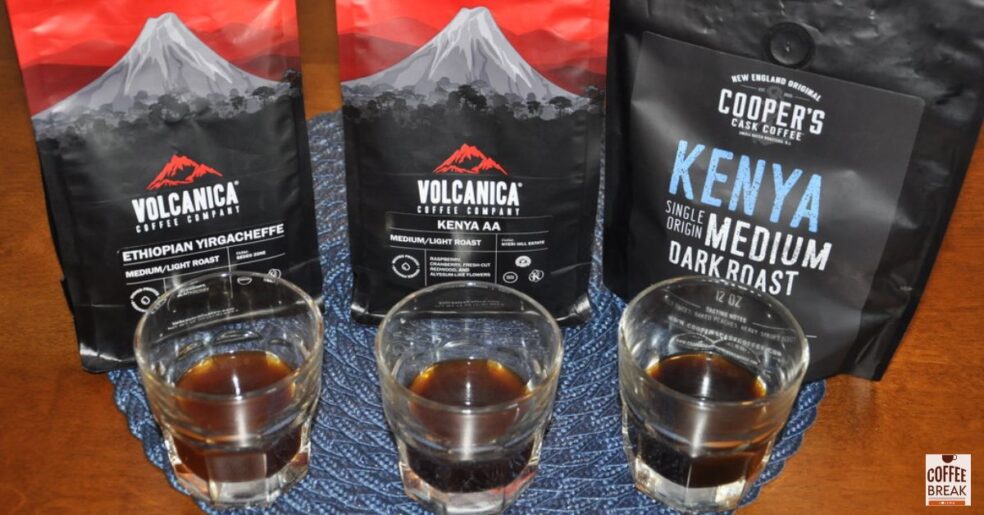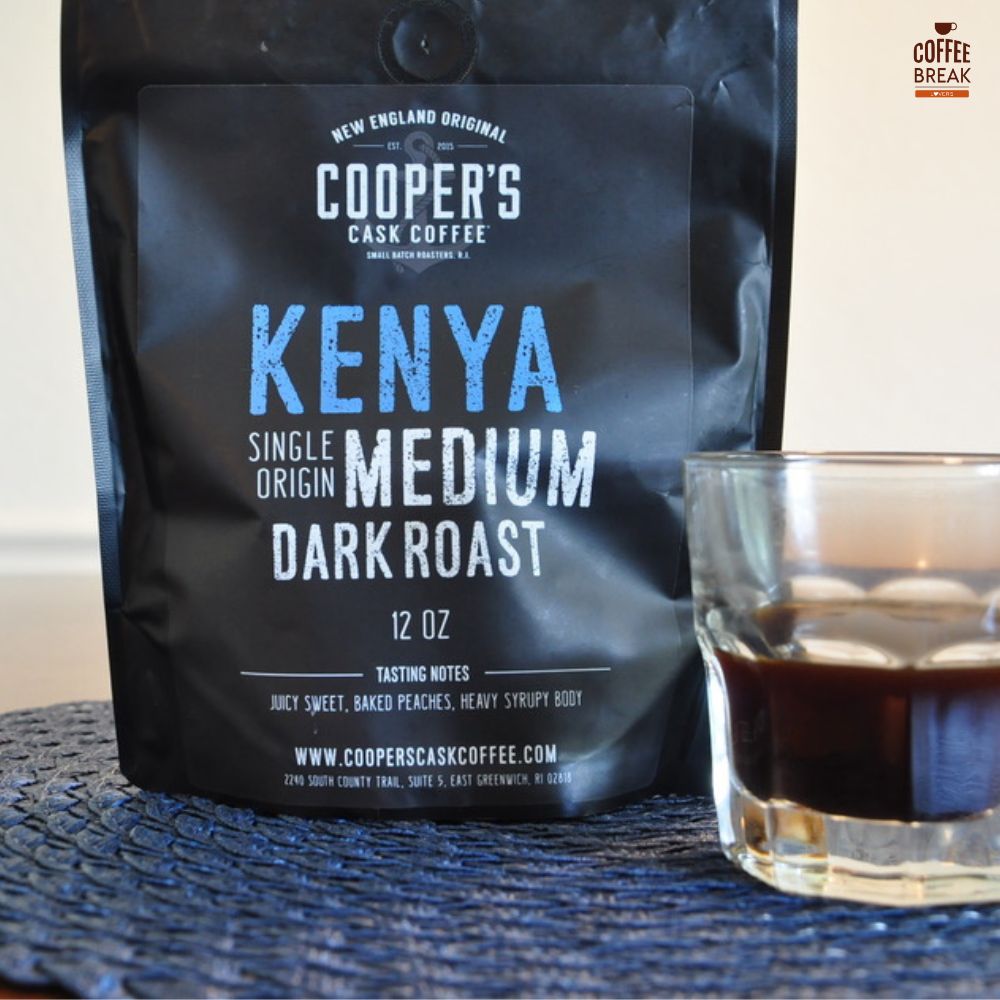Kenyan and Ethiopian coffees are known as some of the best in the world. But if you’ve never tried them before, you may be wondering which one to get first and what you can expect.
In general, both Kenyan and Ethiopian coffees taste of fruit, berries, and citrus. However, Ethiopian coffees tend to have more floral notes while Kenyan coffees are more acidic and citrusy. But their exact flavor profile depends on their region of origin, soil type, and processing method.
If you don’t want to take a deep dive into the flavor profiles of these coffees and just want recommendations, here are my top 3 choices:
- Volcanica’s Ethiopian Yirgacheffe (light medium roast)
- Volcanica’s Kenyan AA (light medium roast)
- Cooper’s Kenyan AA (medium dark roast)
On the other hand, if you’re ready to learn how to pick the best Ethiopian and Kenyan coffees for you, keep reading!
Kenyan Coffee vs Ethiopian Coffee (Flavor Profiles)
The countries of Kenya and Ethiopia are right next to each other, so their coffee beans have certain flavors in common. Specifically, they’re both typically described as fruity and citrusy.
But they also have their differences. While both coffees are fruity, each evokes a unique fruit. Ethiopian coffees also lean towards more floral tones, while Kenyan coffees tend toward citrus and chocolate flavors.
Check out the tables below for a summary of the general flavors found in these coffees.
Flavors Commonly Found In Kenyan Coffees
| Fruity |  | Kenyan coffees are known for having the flavors of cranberry, raspberry, strawberry, and even guava. |
| Citrus |  | Kenyan coffees are known for their acidity and may have notes of lemon or bergamot orange |
| Chocolaty |  | Some Kenyan coffees are known to taste of chocolate or spice |
Flavors Commonly Found In Ethiopian Coffees
| Fruity |  | Ethiopian coffees are famous for their blueberry flavor, but may also have peach, plum, or blackberry flavors |
| Citrus |  | Some Ethiopian coffees may include notes of lemon, mandarin orange, or other citrus |
| Floral or Herbal |  | Depending on the region, Ethiopian coffees may also have notes of jasmine, rose, or even tea-like flavors |
Of course, these are just tendencies found in the coffees. And no coffee has all of the flavors listed in the tables above. Instead, coffee from one growing region has some of the flavors, and coffee from another region has a different set of flavors.
But which coffee beans should you buy to get the flavors you want? That’s what we’ll look at next!
Kenyan Coffee Beans And Their Flavor Profiles
Kenya has several different regions that produce unique coffees. The soil, climate, altitude, and processing methods all contribute to the bean’s aromas and flavors.
And while there’s a lot we could say about the growing conditions of each coffee, it’ll be more useful to just show you the most popular beans available and their flavor profile.
| Coffee | Flavor Profile | Image |
| Kenya AA | A medium/light roast that tastes of raspberries, cranberries, redwood, and alyssum-like flowers | 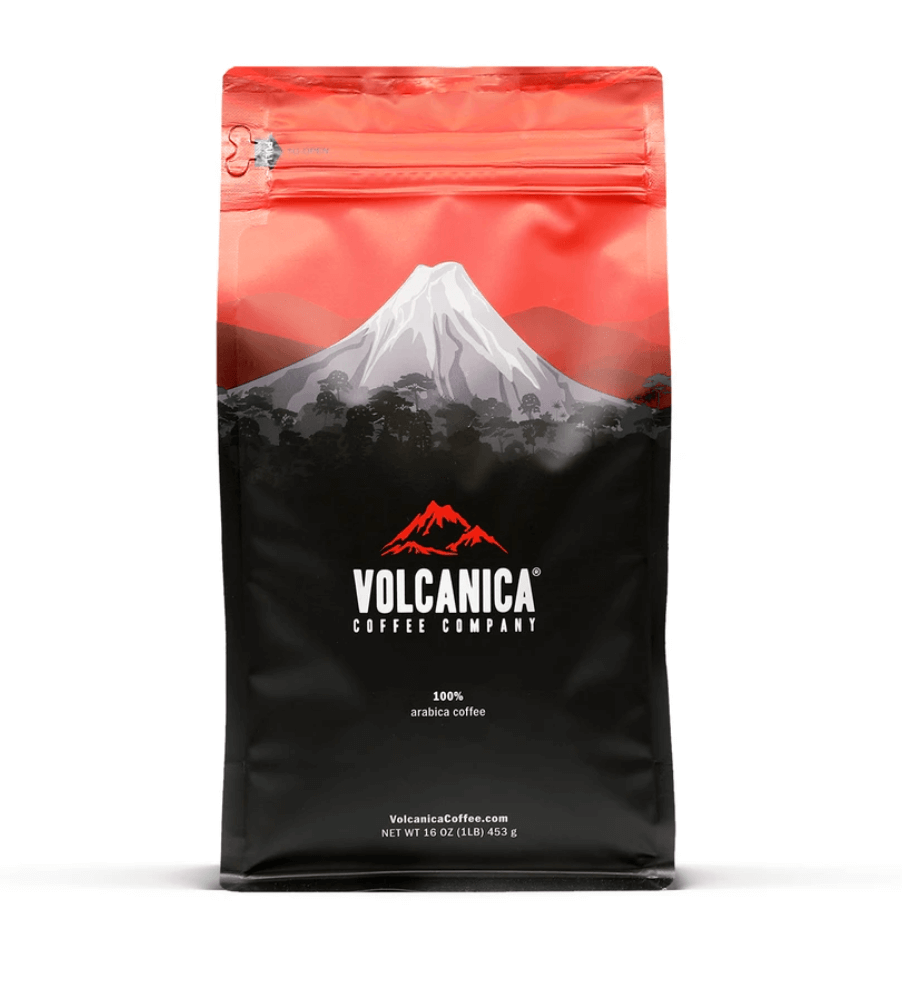 |
| Kenya Natural Process | Light roasted beans that taste of cranberries, chocolate, and spices |  |
| Kenya Peaberry | These medium roasted beans have notes of strawberry, lemon, and guava |  |
Each of these coffees tastes phenomenal and is definitely worth a try.
If you want to read more about the flavors of Kenyan coffee, check out our post “What Does Kenyan Coffee Taste Like?“
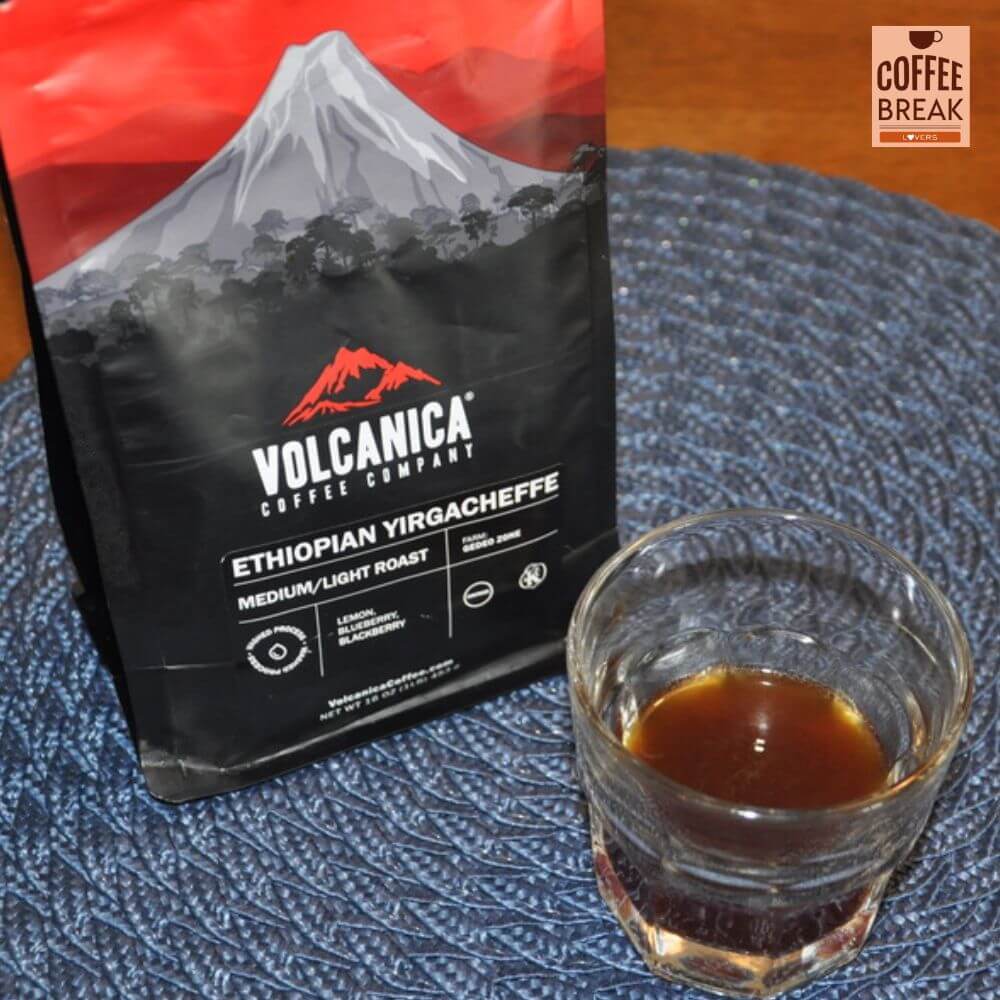
Ethiopian Coffee Beans And Their Flavor Profiles
Like Kenya, Ethiopia has several coffee-growing regions that produce their own unique and complex coffee beans.
The most famous coffee region is Yirgacheffe, which is known for producing high-quality specialty coffee. But all the regions produce great coffees.
| Coffee | Flavor Profile | Image |
| Ethiopian Yirgacheffe | This is a medium/light roast that tastes of lemons, blueberries, and blackberries |  |
| Ethiopia Natural | A light roast with notes of blueberry, jasmine, and sugarcane |  |
| Ethiopia Sidamo | Medium/light roast with honey, jasmine, and stone fruit flavors |  |
| Ethiopian Kochere Chelelektu | Medium/light roast with notes of blackberries, plums, grapes, and mandarin orange |  |
Which Roast Is Best For Kenyan Or Ethiopian Coffee?
As a general rule, lighter roasts retain the coffee bean’s natural flavors while darker roasts heighten the caramel and roasty flavors.
So, to better appreciate the natural flavors of your African coffee we recommend sticking to lighter roasts. But, of course, there are benefits to each type of roast.
Benefits Of Lighter Roast Coffees
The main benefit of light roast coffee is that you can fully enjoy the unique flavors of your beans.
As we’ve seen, Kenyan and Ethiopian coffees have flavors of blueberry, cranberry, honey, jasmine, lemon, orange, chocolate, and more. And the best way to fully enjoy these incredible flavors is to buy lighter roasts.
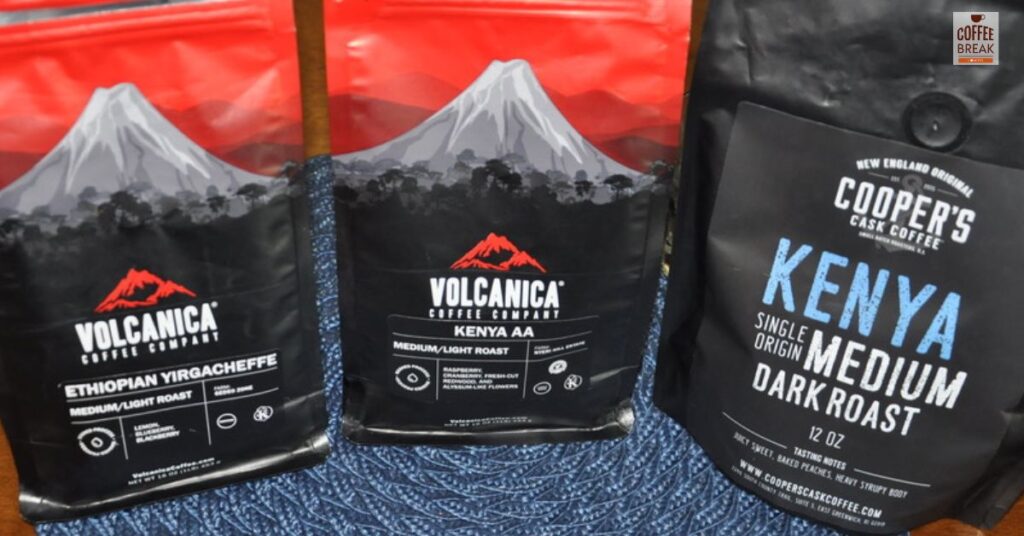
Benefits Of Buying Darker Roast Coffees
I’m personally sensitive to light roast coffees and find that they can quickly give me a headache. But this issue doesn’t occur with roasts that are medium/light or darker.
If you have this issue, a darker roast may be a good option for you as well.
Besides that, another benefit of darker roasts is that they can give your coffee a sweeter taste.
For example, Cooper’s has a medium/dark roast Kenyan coffee. This roast may seem too dark for an African coffee, but in fact, it retains some of the fruitiness while having a strong caramel flavor. The result is a wonderful coffee that tastes like a baked fruit pie.
I’d highly recommend picking up a bag of Kenyan coffee from Cooper’s site.
What’s The Best Way To Brew Kenyan And Ethiopian Coffee
The best coffee-brewing method is the one that gives you the results you want.
However, if you’ve never tried Kenyan or Ethiopian coffee before and want the best experience, we’d recommend one of the following methods:
- espresso
- French Press
- cold brew
Espresso Made With Kenyan or Ethiopian Beans
Because espresso extracts the coffee under several bars of pressure, you’ll get the maximum amount of solubles in your cup. This makes it very easy to taste the flavors of your coffee.
And when you add steamed milk it changes the flavor profile and gives you a different experience.
For example, Ethiopian Yirgacheffe coffee tastes fantastic and fruity on its own, but when I add steamed milk it tastes like toffee.
(The espresso machine we use is a Breville Barista Express which you can order on Amazon.)
Related Post:
French Press Coffee Made With Kenyan Or Ethiopian Beans
A French Press is far better at extracting flavor than a pour-over or drip machine. And since there are no paper filters involved in a French Press, all of the coffee’s complex and nuanced flavors remain in your cup.
This is why we recommend using a French Press over these other methods.
(We use a Mueller French Press which you can find on Amazon.)
Cold Brew Made With Kenyan or Ethiopian Coffee
With cold brew, fewer oils and acids are extracted from the beans which result in a smoother cup of coffee.
Because Ethiopian and Kenyan coffees are typically sold as lighter roasts, they tend to be more acidic. So, cold brew is a great option if you want to reduce the acidic flavors or reduce the acid because of a sensitive stomach.
However, one drawback here is that cold brew is much less aromatic than hot brewed coffee. So, you won’t be able to enjoy the aromatics these African coffees are known for.
If you’d like to read more about this topic, check out our post “Why Is My Cold Brew Acidic?“)
Processing Methods Of Kenyan And Ethiopian Coffee
There are two methods for processing coffee beans:
And either of them can be used when processing Ethiopian and Kenyan Coffees.
(Note that Volcanica’s Ethiopia Natural and Kenya Natural coffees are both dry processed while the others are wet-processed.)
The method used will have a huge impact on your coffee. Let’s quickly discuss each one and see how it affects coffee’s flavor profile.
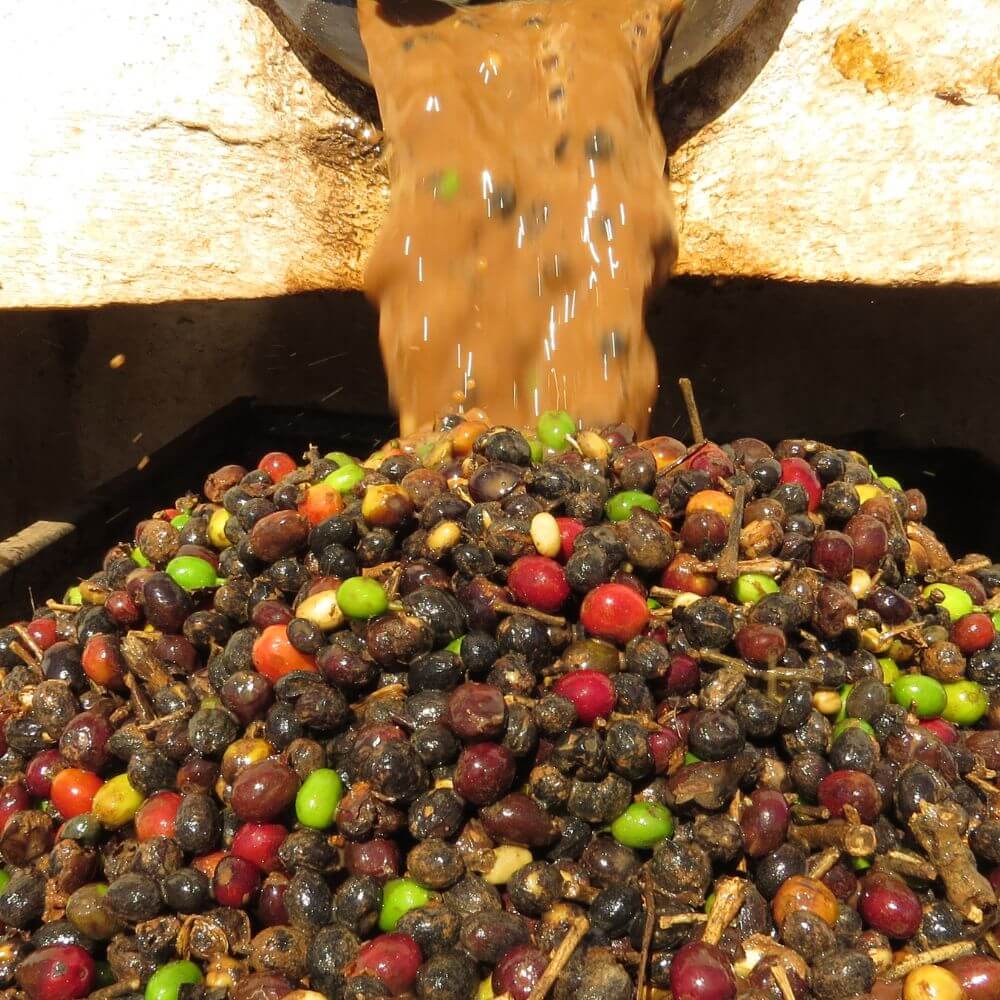
Wet Processed (Washed Processed)
When coffee cherries are wet processed, the fruit is removed from the coffee seeds before they are dried. This process uses equipment and a lot of water to get the job done.
The result is a coffee that’s fruity, has pronounced acidity, is well-balanced and complex.
So, by getting wet-processed coffee, you’ll be tasting the flavors that are really inherent in the bean.
Dry Processed (Natural Processing)
Dry processing is when the coffee seed dries inside the coffee cherry. This process allows the seed to marinate in the fruit’s natural juices.
The result is a coffee that has a heavier body, is more earthy, is sweeter, more intense, and has more inconsistent flavors.
By getting dry processed coffee, you’ll be tasting a lot of flavors that are inherent in the fruit itself as well as the bean.
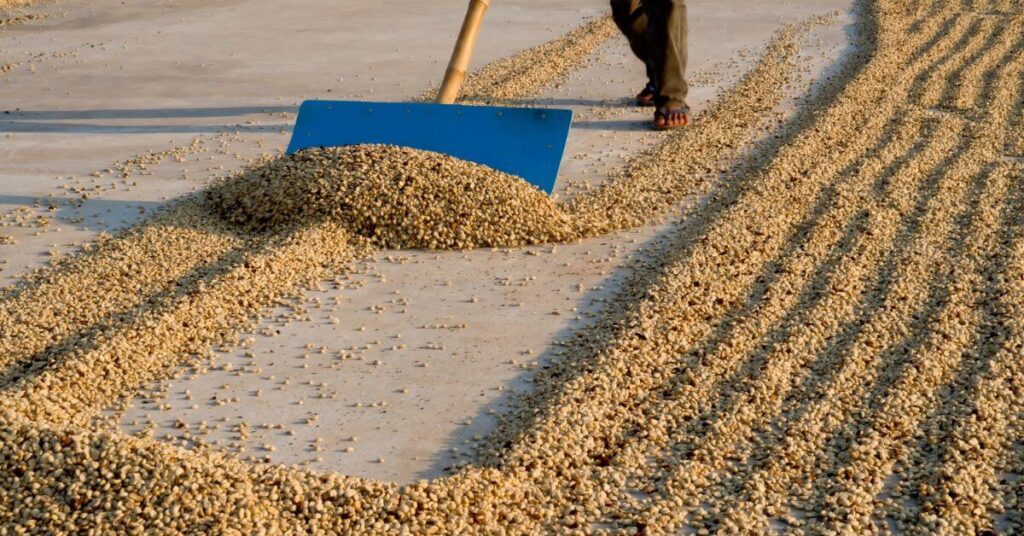
Should I Try Ethiopian Or Kenyan Coffee?
I definitely recommend for you to try both Kenyan and Ethiopian coffees.
If you don’t know where to start, consider trying Ethiopian Yirgacheffe or Kenya AA (both from Volcanica). They’re two of my favorites and are quite popular.
If you prefer the taste of blueberries, blackberries, and lemons, then you should go with the Ethiopian. However, if you want something more woody with cranberry and raspberry notes, then choose the Kenyan.
On the other hand, if you want something a bit more dark that tastes like dessert, try Cooper’s Kenyan AA.
Key Takeaways
- Both Kenyan and Ethiopian coffees are fruity and citrusy, but Kenyan coffee is known more for cranberry while Ethiopian coffee is known for its blueberry flavor.
- Light roast beans retain much of the bean’s natural flavor but darker roasts impart caramel flavors which can enhance the coffee’s taste profile
- The best brewing methods for these coffees are espresso, French Press, or cold brew.
- Wet processed beans are well balanced and make a cleaner cup. Dry processed beans are more intense and have a heavier body.
Cheers Coffee Lovers!

KEEP READING
- What Are The Best Coffees For Moka Pot Brewing?

- Cafe Bustelo vs Pilon (Which One Should You Choose?)
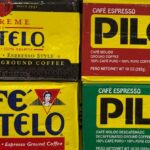
- Is Cafe Bustelo Cuban? (Discovering Its Origins)

- Best Cold Brew Coffee For Intermittent Fasting!

- Kenyan Coffee vs Ethiopian Coffee (Which One Should I Buy?)

- Can You Buy Cuban Coffee In The US? (And How To Get It!)
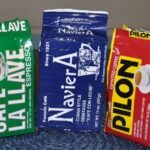

Oliver is co-owner of Coffee Break Lovers. The only thing he loves more than the process of brewing coffee is drinking it.

